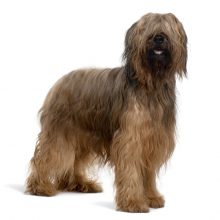Briard
Lifestyle Needs

The Briard is a large, stocky and rugged dog, with a long, flowing coat which needs daily attention. His job was to guard and herd sheep and in modern times makes an excellent guard dog. He is fearless without being aggressive and would enjoy the rough and tumble of family life. However he does need training and a firm hand as he doesn’t know his own strength. He needs to live in a large house with a large garden with easy access to the open country side. He should have at least two hours exercise every day.
Genetic Diversity
(Known as Coefficient of Inbreeding: 'COI'. It should be as low as possible.)
The UK Kennel Club breed average COI is 5.1% - See 'A Beginners Guide to COI'
Gene Pool Size
(Known as Effective Population Size: 'EPS')
TBC
EPS is a measure of how many individuals are contributing genetically to a breed population. It is a measure of the size of the gene pool in a breed. Lower than 100 is considered critical by conservationists and below 50 brings a breed close to extinction. For more information see the Kennel Club article.
Health and Welfare Problems due to Conformation
(Body shape and physical characteristics)
The Briard’s body structure is well balanced but his excessive hair could cause him problems if not very carefully and regularly groomed and cared for.
BVA/KC Health Schemes: www.bva.co.uk/chs
- Hip dysplasia: breed 5 year mean score 12.2 (parents should be lower)
- Elbow dysplasia (should be as low as possible)
- Eye disease: full ophthalmological testing required before breeding
Estimated Breeding Values (EBVs) : No EBVs are currently available for this breed
www.thekennelclub.org.uk/about-ebvs
DNA Tests Available
DogWellNet and IPFD Harmonisation of Genetic Testing for Dogs (HGTD)
www.dogwellnet.com/breeds
- Congenital stationary night blindness (CSNB) (Hereditary Retinal Dystrophy)
Availability of a DNA test does not mean that it is always necessary or even desirable for breeders to use this test.
Other Breed-Specific Health Screening Schemes
- Breed club insists that all dogs used for breeding should be either proven hereditarily clear of CSNB or have a DNA test before breeding. Identified carriers may be used only to clear mates. Offspring must also be DNA tested.
Ask the breeder to show you the certificates for the above tests/screening for both parents. If any of the above tests have not been considered necessary by the breeder (and there may be good reasons), ask her to explain why.
Other Diseases Reported
(For which there are currently no genetic or screening tests for sire or dam)
- Lymphoma
- Squamous cell carcinoma – digit
- Ectopic ureter
Ask the breeder about the medical history of the parents, grandparents and great grandparents. Consider carefully whether to purchase a puppy if some of these or other diseases are in the family line.
Ask about the breeder’s policy in cases of serious genetic diseases occurring to your puppy in later life. Good breeders will request to be informed of such events in order to improve future breeding decisions.
You are strongly advised to buy from a breeder who uses (or is prepared to use) the AWF Puppy Contract and Puppy Information Pack (PIP): www.puppycontract.org.uk
The breeder should also be familiar with the CFSG/DBRG Code of Practice for Dog Breeding